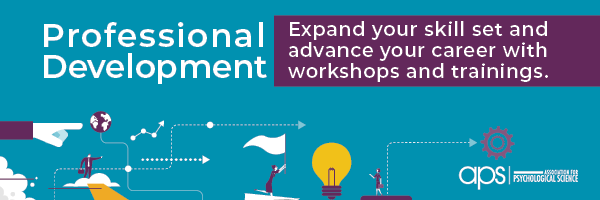APS Spotlight
APS Expands Career Resources, Professional Development in 2023

What are the best science-based teaching and learning strategies? What’s new in methodology, open research, and theory? How can you more effectively pitch your science to the media? What practices will help you perfect the art of writing a resume or research statement, serving as a peer reviewer, or preparing for an interview? In response to these and other questions from APS Members, a new series of educational workshops and trainings in 2023 is designed to help psychological scientists further their careers inside and outside of academia, while fostering a more transparent and valid science on the global stage.
Free or discounted for APS Members, APS’s Professional Development programs will be delivered primarily online, but some courses are likely to be offered in person. A teaching workshop, Becoming a Better Teacher: Maximizing Learning and Minimizing Effort, kicked off the program in December to 348 registrants from the psychological science community.
Strengthening the global psychological science community
The new workshops and trainings aim to serve several goals and objectives delineated in the APS Strategic Plan 2022–2027, particularly those involving improving psychological science education and training, resource sharing, and advances in the field. Rigorously designed and taught by experts, they will strengthen the practice of science among psychological scientists, particularly those early in their careers, by supporting opportunities for teaching, mentoring, skills development, leadership, and career advancement—both within and outside of academic settings.
Offered throughout the year, the workshops and trainings will fall into three major categories:
- Professional development—including science communication, peer review, statistics, and teaching.
- Career advancement—including tools for the job market (e.g., writing a resume; writing a research statement; preparing for an interview), grant writing, and funding.
- Know the field—including mental health in academia, careers outside of academia, and public interest/policy.
All the programs will define clear learning outcomes and offer participants materials and summaries they can use in their practice. Expert instructors will be encouraged to use the best science-based teaching strategies to deliver the content—a defining characteristic of APS programs, which are created to conform to the best science-based learning strategies to maximize participants’ outcomes.
Feedback on this article? Email [email protected] or login to comment. Interested in writing for us? Read our contributor guidelines.





APS regularly opens certain online articles for discussion on our website. Effective February 2021, you must be a logged-in APS member to post comments. By posting a comment, you agree to our Community Guidelines and the display of your profile information, including your name and affiliation. Any opinions, findings, conclusions, or recommendations present in article comments are those of the writers and do not necessarily reflect the views of APS or the article’s author. For more information, please see our Community Guidelines.
Please login with your APS account to comment.